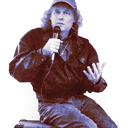Hoarding, holding on to possessions that do not advance a person’s life or that would be more valuable elsewhere, can have a huge impact on the life of an individual or a household — but how big is it in the world outside? It is bigger than you would think. Hoarding is so widespread that it can move the world’s largest national economy. As I wrote in my Shamanic Economist blog today, hoarding by businesses was so big in the fourth quarter of 2009 that it gave the worst recession in recent U.S. history the appearance of a recovery for that quarter.
Economic recovery sounds like a good thing, but it is a tragedy when thousands of businesses are spending billions of dollars on things that they can only store for later, and ultimately throw away at additional expense. Yet in the United States, we are all part of a culture of hoarding. It is part of the pre-industrial mindset that comes to us from the 19th century, and most of the time, we are not even aware of the ways the hoarding mentality colors our thinking. What is needed is a shift in emphasis from preserving the value of things, as important as that is, to maximizing our ability to work, which is ultimately what will deliver our success.
We can all be part of the solution by making this shift in our individual lives. If you are thinking of buying something that you realistically may never have the chance to use, let it pass. Focus instead on acquiring the things you need for what you are doing right now — the things that will improve your ability to deliver immediate results. Clear away clutter and give yourself more room to work. Shorten your to-do list so that you can take more immediate action. This all sounds terribly mundane until you start doing it, and then you realize: the shift in emphasis from things to action is a shift potentially big enough to change everything.

